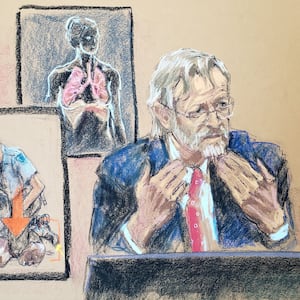The medical examiner who wrote the controversial report on George Floyd’s cause of death testified on Friday that the cops’ restraint “was just more than Mr. Floyd could take”—but he wouldn’t rule out the role of drugs and heart issues.
Hennepin County Medical Examiner Dr. Andrew Baker’s testimony provided a small glimmer of hope for Derek Chauvin’s defense team after a devastating week of evidence in which the Minneapolis Police Chief said the former officer “absolutely” violated protocol, and two renowned medical experts said Floyd died of low oxygen caused by the cops’ actions alone.
Baker’s official report listed Floyd’s cause of death as “cardiopulmonary arrest complicating law enforcement subdual, restraint, and neck compression.” He listed hardening and thickening of the artery walls, heart disease, fentanyl use, and methamphetamine use as “other significant conditions.”
ADVERTISEMENT
The report’s mention of drug use and heart issues, and its omission of any reference to oxygen deprivation, outraged Floyd’s family last year, prompting them to commission their own independent report, which won’t be shown to the jury, that concluded Floyd died of strangulation.
It also became the crux of Chauvin’s defense, which is that Floyd’s death was partly the result of factors unrelated to the arrest, like pre-existing heart issues and drugs, and Chauvin was only doing what he had been trained to do as a cop.
On Friday, Baker said his cause of death was “fancy medical lingo for the heart and the lungs stopped. No pulse, no breathing.” It occurred “in the setting of” law enforcement subdual, restraint, and neck compression, he said.
While Baker said Floyd was “generally healthy” before May 2020, he refused to rule out Floyd’s heart issues—high blood pressure, carotid arteries, a larger-than-normal heart due to hypertension—as playing a role in the death.
“He has a heart that already needs more oxygen than a normal heart, by virtue of its size, and it’s limited in its ability to step up to provide more oxygen,” he said. “In my opinion the law enforcement subdual, restraint and neck compression was just more than Mr. Floyd could take by virtue of those heart conditions.”
He said the amount of fentanyl was higher than amounts found in some fatal overdoses, and the methamphetamine would have increased the work Floyd’s heart had to do to keep pumping oxygen.
But, ultimately, he said that was not the cause of death. The “topline” was that Floyd’s heart and lungs stopped “in the setting” of the officers’ activities.
“It was the stress of that interaction that tipped him over the edge given his underlying heart disease and toxicological status,” he said.
A veteran medical examiner, who previously worked in the Hennepin County office with Baker, testified on Friday that she agreed with Baker’s official cause of death—but thought it was solely due to the officers’ activities.
Dr. Lindsey Thomas said drug levels were “very low” and his slow death over several minutes indicated that it wasn’t a heart attack. “This is not a sudden cardiac death,” she said.
She said the mechanism of death was “asphyxia or low oxygen”—echoing testimony from an Illinois pulmonologist on Thursday who said Floyd’s lungs and breathing apparatus were slowly cut off by the combination of four factors: Chauvin’s left knee on Floyd’s neck, Floyd’s prone position during the arrest, Chauvin’s right knee on Floyd’s back, arm, and side, and the combination of handcuffs and the roadway acting like a vice for Floyd.
“Put all together… what it means, to me, is that the activities of the law enforcement officers resulted in Mr. Floyd’s death,” Thomas said.
After viewing videos of Floyd’s death, she could pinpoint the moment she saw an “anoxic brain reaction,” which looks like a twitch and is what the body does when the brain no longer has enough oxygen.
Chauvin kept his knees on Floyd for several minutes after that moment, she said, even after another cop said there’s no pulse. “They maintain the position so, at that point, his heart has also stopped,” she said.
Thomas said that “other significant conditions” are usually only included on death certificates for public health and research purposes, and none of them caused Floyd’s death.
However, under cross-examination, she conceded that, if the police were taken out of the equation, she may have concluded that heart problems or drug use were the cause of death.
Chauvin, 45, is on trial for second and third-degree murder as well as second-degree manslaughter after holding his knee on Floyd’s neck for over nine minutes during the arrest over a counterfeit bill. Three other officers—Tou Thao, Thomas K. Lane, and J. Alexander Kueng—will face a trial in August.
Nelson has raised questions about whether the distressed crowd of bystanders and Floyd’s refusal to initially get into a squad car factored into Chauvin’s level of force. However, several current and former Minneapolis police officials, and use-of-force experts, have testified that it was not part of his training and was “totally unnecessary” once Floyd had stopped resisting.







